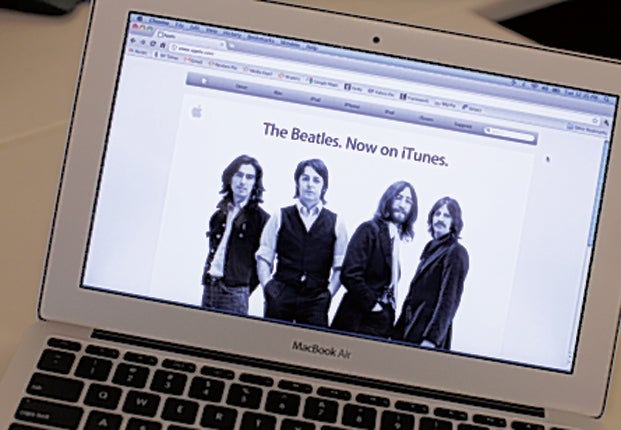Cyberclinic: Did The Beatles need iTunes? No, but EMI did

With another autumn came another flood of anticipation that The Beatles' back catalogue might be made officially available for download, which in turn offered another chance for music and technology hacks to sign off a speculative article with the phrase "Tomorrow Never Knows". But no longer. An annual tradition is over; you can finally buy The Beatles' tunes in disembodied digital format from Apple's iTunes store. What a relief.
It's certainly a relief for Ringo Starr, who was quoted in Apple's press release as being glad that he'd no longer be asked about it. But the idea of irate Beatles fans pestering Ringo and Paul about an opportunity to pay for Beatles MP3s seems faintly absurd. It's not as if we've been deprived of The Beatles' music. It's everywhere – on the radio, on vinyl in junk shops, on CDs available both online and on the high street, and, most notably, strewn across the internet in easily downloadable illegal versions. If you want to listen to The Beatles on your MP3 player, you can already do so; you don't need to pay twice. I don't know anyone who's been clamouring for this except those who've been paid to write about it. If there are Beatles fans for whom this is a truly momentous day, one wonders if they'd get similar joy from their favourite books being re-published using slightly different paper.
However, this does mark an important moment in the history of the music business's fraught relationship with the internet. Very few major artists are still holding out against the concept of the digital download – and in The Beatles' case it didn't even appear to be a moral objection, but more to do with contractual issues and the bitter history of legal wrangling between The Beatles' Apple Corps and Apple Inc over the computer giant's right to be involved in the music business under the "Apple" banner. The handful of acts that are still unwilling to play ball with Apple (or any other digital outlet) have now lost their Liverpudlian allies. And while the absence of "Hollywood Nights" by Bob Seger and the Silver Bullet Band from iTunes might feel like a crusading personal triumph for Bob Seger, to everyone else it either doesn't matter, or just looks a bit weird.
It's a coup for Apple, and is the ultimate feather in the cap for a company that dominates the sale of online music. Did iTunes really need The Beatles? Not really. Did The Beatles need iTunes? No – but EMI, who like most major record companies haven't been having the best of times, probably needed this deal. It's becoming increasingly clear where the balance of power lies within the industry, and it's not with record labels. So, "Yesterday" et al are all now available. They're not cheap in comparison with other online music: 99p for a track, £10.99 for an album, £17.99 for a double album, with the Beatles Box Set – or, rather, a collection of zeros and ones that together sound very similar to the Beatles Box Set – at £125, some £30 more than you'd pay if you were living in the USA. While the two respective Apples are probably delighted, I am ambivalent. Goo goo g'joob.
I found myself applauding quietly at one piece of early Christmas preparation that surfaced on the web this week. Paul Hunkin, a PhD student in New Zealand, has written some code that automatically bids on low-priced, "strange and esoteric" items on TradeMe, the Kiwi equivalent of eBay. It also automatically pays for them and has them sent to his address. After a mundane start with a pack of watch batteries, the bot has now upped its game with a YuGiOh SOVR-EN076 Gemini Booster (whatever that might be), an old envelope featuring some stamps from the 1955 New Zealand International Stamp Expo, and a sheet of temporary tattoos featuring some birdlife. While this represents a small triumph in the world of programming, I'm not sure that Hunkin's family will be that delighted come Christmas morning.
Join our commenting forum
Join thought-provoking conversations, follow other Independent readers and see their replies
Comments
Bookmark popover
Removed from bookmarks